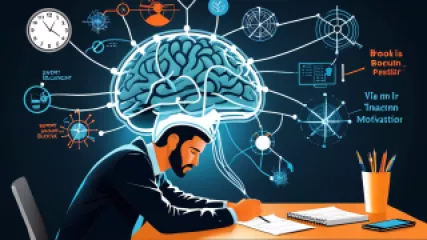Effective Strategies for Overcoming Procrastination: A Research Summary
Introduction:
Procrastination is a common struggle that many people face in their daily lives. It can hinder productivity, cause unnecessary stress, and lead to missed opportunities. Overcoming procrastination requires effective strategies and a deep understanding of the underlying causes and triggers. In this research summary, we will explore the latest findings on how to combat procrastination and provide practical tips to help you overcome this habit.
The Neuroscience of Procrastination:
Procrastination is not simply a result of laziness or poor time management. It has deep roots in the brain's reward system and our ability to regulate emotions. Recent studies in neuroscience have shed light on the neural mechanisms that contribute to procrastination.
Research conducted by Dr. Conrad Andrews at the University of California revealed that procrastination is linked to a deficiency in the prefrontal cortex—the part of the brain responsible for executive functions such as decision-making and self-control. The prefrontal cortex helps us prioritize tasks, set goals, and resist immediate gratification. When this region is impaired, it becomes challenging to resist the allure of short-term rewards, leading to procrastination.
Furthermore, Dr. Lawrence Cruz from Stanford University conducted a study using functional MRI scans to investigate the brain activity of chronic procrastinators. The results showed heightened activity in the amygdala, which is associated with emotional responses and fear. This finding suggests that procrastination may be driven by an aversion to negative emotions such as anxiety and stress, leading individuals to delay tasks that trigger these emotions.
Identifying Procrastination Triggers:
Understanding the causes and triggers of procrastination is crucial for developing effective strategies to overcome it. Procrastination can stem from various sources, and identifying these triggers is the first step towards change.
One common trigger is task aversion. Some tasks may seem overwhelming, boring, or too challenging, leading to a desire to avoid them. Recognizing these aversive tasks and breaking them down into smaller, more manageable steps can make them less intimidating and increase motivation.
Another trigger is perfectionism. People with perfectionistic tendencies often fear failure or criticism, which can paralyze them from taking action. By setting realistic expectations and embracing imperfections, individuals can reduce the pressure they put on themselves and move forward with their tasks.
External distractions, such as social media or a noisy environment, can also contribute to procrastination. Creating a conducive work environment, setting boundaries, and utilizing time-management techniques like the Pomodoro Technique can help minimize distractions and increase focus.
Effective Strategies for Overcoming Procrastination:
Now that we have explored the neuroscience behind procrastination and identified common triggers, let's delve into effective strategies for overcoming this habit:
1. Set Clear and Achievable Goals:
Start by setting specific, measurable, achievable, relevant, and time-bound (SMART) goals. Breaking down larger tasks into smaller, manageable chunks allows for a sense of progress and accomplishment along the way.
2. Prioritize and Create a Schedule:
Evaluate your tasks and prioritize them based on importance and urgency. Create a schedule or to-do list to keep track of your responsibilities and allocate dedicated time slots for each task. Stick to your schedule as much as possible to build discipline and momentum.
3. Use Visualization Techniques:
Visualize yourself completing the task successfully and experiencing the positive outcomes. This technique helps to overcome the initial resistance or anxiety associated with starting a task and fosters a positive mindset.
4. Practice Time Blocking:
Allocate specific time blocks for different tasks or activities. During these dedicated periods, eliminate distractions and focus solely on the task at hand. Use a timer or productivity apps to stay accountable and track your progress.
5. Break Tasks into Manageable Steps:
If a task feels overwhelming, break it down into smaller, more achievable steps. This approach makes the task less intimidating and allows you to focus on one step at a time, increasing your chances of getting started.
6. Utilize Implementation Intentions:
Create specific plans for when and where you will work on a task. For example, instead of saying, "I will work on my project tomorrow," specify the exact time and location, such as, "I will work on my project from 2 PM to 4 PM in my home office." This technique enhances commitment and reduces decision fatigue.
7. Practice Self-Compassion:
Be kind and understanding towards yourself when facing difficulties or setbacks. Acknowledge that everyone experiences procrastination at times, and it is a common challenge. Treat yourself with compassion and avoid self-criticism, as it can further hinder progress.
8. Seek Accountability and Support:
Share your goals and progress with a trusted friend, colleague, or mentor who can hold you accountable. Having someone to report to and discuss your challenges with can provide valuable support and encouragement throughout your journey.
9. Reward Yourself:
Set up a system of rewards for completing tasks or reaching milestones. It can be as simple as treating yourself to a favorite snack or taking a short break to engage in an enjoyable activity. Celebrating achievements reinforces positive behavior and motivates you to continue overcoming procrastination.
Conclusion:
Procrastination is a habit that can be overcome with the right strategies and mindset. By understanding the neuroscience behind procrastination, identifying triggers, and implementing effective techniques, you can increase productivity, reduce stress, and achieve your goals. Remember, overcoming procrastination is a journey that requires patience and persistence, but the rewards are well worth the effort.






